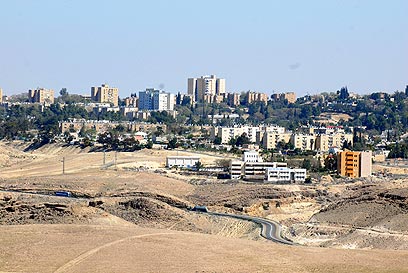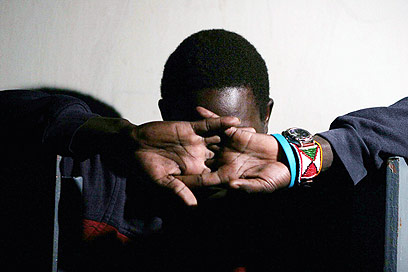
Arad residents don't want refugees
Southern city's hospitality replaced by fear, aversion and loathing towards African infiltrators, with residents setting up committee to thin out their presence in area. 'The future is black,' one resident says
"The blacks have Sinai, the Chinese have China, and the Moroccans and Russians have Arad," says cab driver Leon.
"I don't want my grandson to be in a kindergarten with Sudanese," says Alexander, a veteran immigrant, who claims the refugees have not undergone proper medical examinations. "Their women are pregnant with many kids," he states. When asked about large Israeli families, he gets angry: "It’s my garbage. It's stinks, but it's mine."
Only taxi driver Haim asks to calm everyone down, saying that "the Sudanese of all people are the ones who saved Arad. They rent apartments here and spend money at the center."
The other cab drivers shout at him angrily. "But without the Bedouins and Sudanese Arad is dead," he tries to defend himself. "They take our jobs," says Alexander in an attempt to settle the argument.
In the past, Arad was a sought after desert diamond, and those who wished to be absorbed in the city were required to appear before admission committee. Today such committees no longer exist. In order to be an Arad resident, all one has to do is to arrive in the city.
Some of the residents, who have had enough of the burden of infiltrators falling on their city, have decided to set up a committee of action with the goal being an equal distribution of the burden. In the past few months the committee has been meeting every week in a bid to find a way to reduce the number of infiltrators settling in the city.

Refugees' paradise – resident's hell. Arad (Archive photo: Herzel Yosef)
'Arad has become periphery's dustbin'
"What about Dimona? What about Beersheba?" asks one of the committee members. "Is Arad all there is?"
Maxim Oknin, a committee member and a former City Council member, says "Arad has been chosen to be the Darfurians' paradise. Without a solution we could simply be annihilated."
And this is the problem – the infiltrators' "paradise" is their "hell".
"Arad has become the periphery's dustbin," claims Matti Rose, manager of the Neradim Village for children at risk. "The welfare budget is finished, and one cannot move from one side of the commercial center to another without being afraid."
Fear is the key player here. When there were only dozens of infiltrators, Arad's residents welcomed them kindly. But over time, the hospitality has been replaced by fear, aversion and loathing.
"My daughter is afraid to walk on the street at night," says Moshe Edri. "My family is Arad, and I can't sleep because of this fear."
Marcelo, a volunteer at the jeep unit, speaks about his small children, saying "I see a black future for them."
The committee tries to come up with ways of action. Matti draws the different stages on a board: 1 – leaflets; 2 – traveling to the Knesset; 3 – advertising across the city; 4 – a petition; 5 – a meeting with the mayor; 6 – a major event. They try to build everything ahead of that event, which will be a sort of demonstration of power in which they will present their struggle to the residents and urge them to take part in it.
Not far from the commercial center is a kindergarten for the infiltrators' children. They have been without electricity for more than 10 days, and the landlord refuses to deal with the problem.
Michael Bazian, 45, comes here in the evenings with other Sudanese in order to learn English. After the children come home and the grownups return from work, they gather here in order to study.
Do they feel unwanted here? Are they aware of the committee seeking to deport some of them to a different place? "The people here are kind to us. Our children study in the school together. There's no difference between a Sudanese and Israeli child. No discrimination."
The only discrimination troubling Bazian is that of the Hadera-Gedera procedure. According to this policy, the infiltrators are not allowed to stay in the central region, but only north of Hadera or south of Gedera. This policy has put the periphery towns in charge of the refugees and exempted the established central cities from sharing the burden.
This is a matter Bazian and the committee members see eye to eye on. "Never in my life have I seen a country act this war. We are not enemies but friends, Christians," he says.

'I saw in the paper that we're not wanted here'
Arad has a growing ultra-Orthodox public. The conflicts between the missionaries living in the city and the religious population are a known thing. The fact that many of the infiltrators are Christian has led to the establishment of two new churches, a move troubling the religious community.
"Muslims, Christians and Jews are monotheists," says Bazian. "Hating one another makes no sense."
Asked about the violence among youths at the commercial center, he says, "I don't like what happens there. But if one person does something bad, it doesn't mean they're all bad."
Bazian, one of the community's leaders, attempts to portray the residents of the city he has settled in as he would like to see them. But not everyone shares his thoughts.
Peter John, who came to Israel from southern Sudan, works like many of his fellow community members in the Dead Sea hotels. "The situation in Arad is difficult," he says. "You are not a citizen so you have to get the good and the bad.
The bad, in his eyes, is the resident's attitude towards the Sudanese. "I saw in the newspaper that they don't want us here. I see, I listen." He senses the discomfort and hears the hotel workers' conversations.
Julius expresses himself in a less subtle way: "The Israelis treat us like animals. Why? They think we have taken the Russians' jobs. But the hotel managers need people who will do a good job."
Julius travels every day to the hotels together with the rest of the workers. "At the station, on the way to work, I hear the Russians saying, 'Why are you sitting here beside us? This isn't your place."
And indeed, many are beginning to realize that they may not be their place. In the meantime, they are dreaming of receiving the status of a refugee and work at hotels in order to pay rent.
Acting Arad Mayor Gideon Bar Lev, who replaced Motti Brill who was dismissed two years ago, is trying to take a sensible and serious approach. Asked about the infiltrators issue, he weighs his answers carefully.
The education system has absorbed more than 100 refugees' children. The welfare system is collapsing under the burden, but still holds on. There are no official data about the number of Sudanese, only estimates. Between 700 to 1,000 is a cautious assessment.
"They don’t integrate into the community and shut themselves off," he says. "I think it's outrageous that the government is limiting them to Hadera-Gedera. The local authorities in the periphery are collapsing under the burden of having to deal with them. The State has done something which must not be done by determining where they are not allowed to be – and it's the State's responsibility to find a solution."
'Why don't they build a city just for them?'
The Interior Ministry's policy has turned the infiltrators' problem into a southern problem, and the rise in crime in the southern cities where they have concentrated – Arad and Eilat – has turned into the police's problem. Nonetheless, people have no doubt that the solution must be on a national level.
A grim situation was presented at meeting held a the southern district with mayors, representatives of the Population Administration, the Immigration Administration, the Southern Command and other police officials. The infiltrators' involvement in crime is relatively high, although they are not considered crime generating elements. As time goes by, the number of infiltrators grows, leading to a higher involvement in crime. The problem increases in light of the difficulty in tracking them down and taking them in for questioning.
So what is being done in light of the danger to the resident's personal safety? The police patrols are reinforced, and intelligence and investigation officers have been instructed to ensure that every detainee and interrogee is documented and added to the police database.
Interior Minister Eli Yishai is expected to take part this week in a discussion aimed at helping the mayor solve the infiltrators problem. Yaakov Ganot, head of the Interior Ministry's Population Administration, says this is not a simple matter.
"On the one hand we want to compromise with the mayor, but on the other hand we must take into account that the moment they leave Arad they'll arrive somewhere else. The problem may simply be relocated to a different place."
"I hate them," says high schooler D. while sitting with her friends at a municipal playground, near the kindergarten of the infiltrators' children. Her father took the family to Arad after finding a good job and searching for a quiet town.
"At first there were only a few of them, but suddenly they are all being brought here," she says. Her friend suggests "building a city just for them." They laugh.










